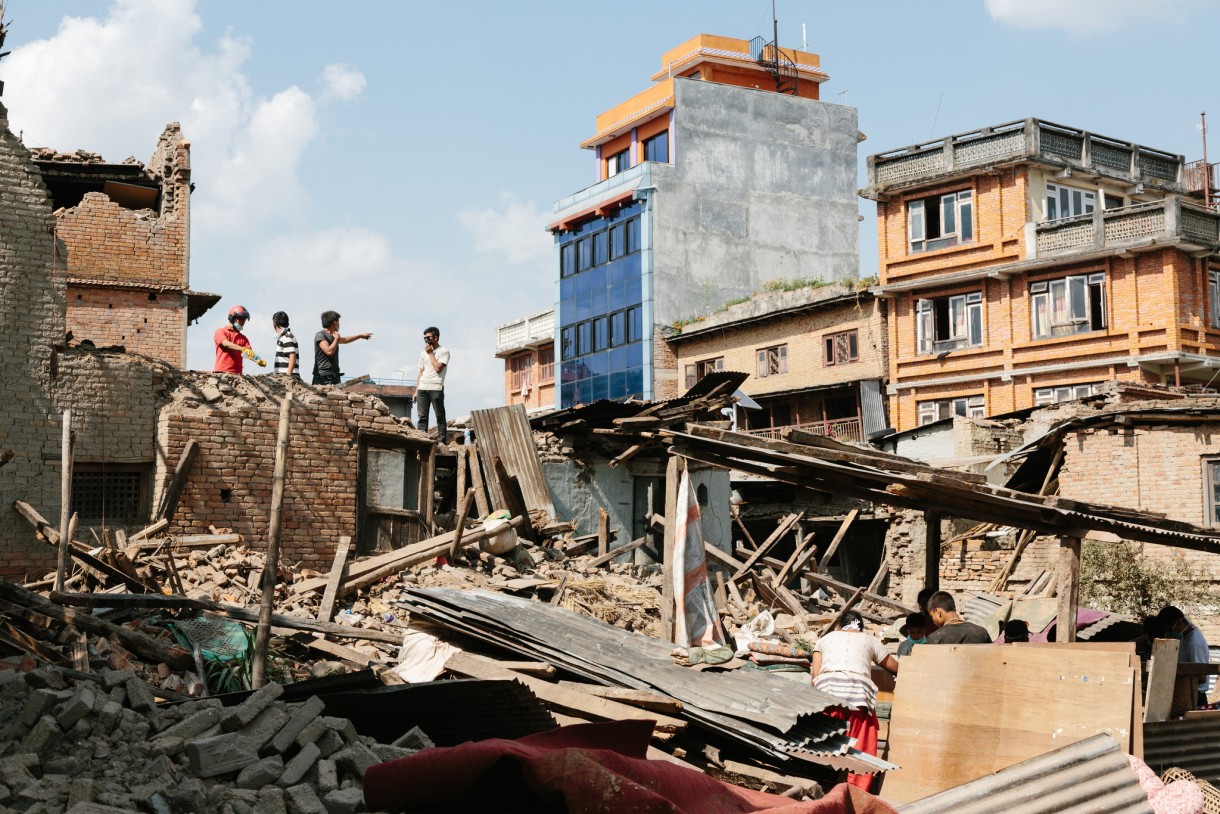Far from Nepal, holding on to hope and memories
 Rashmi Sharma holds a postcard of Kathmandu before the earthquake. Photo: Coco McCabe/Oxfam America
Rashmi Sharma holds a postcard of Kathmandu before the earthquake. Photo: Coco McCabe/Oxfam America
My home city, Kathmandu, was both chaotic and beautiful. When I go back it won’t be the same.
Rashmi Sharma is a monitoring evaluation and learning specialist at Oxfam America. She lives in Boston.
I remember giving my grandmother a kiss at the airport. I remember vividly how long it took to get to the airport—the traffic in Kathmandu is mind-numbing. I remember sitting inside the airplane, waiting for it to take off, wanting so much to sit at the window seat to look at the beautifully chaotic, crowded Kathmandu Valley one last time. That was the only time I cried because I knew I was saying goodbye to all the memories, my childhood, my life as I knew it and to the chaos that I loved so much.
That was 2006, and those are my last memories of my home country, Nepal. My parents moved to Malaysia for work soon after I left for the US. Every year, it’s a struggle to either see my parents in Malaysia or go to Nepal where my grandmother and extended family lives. Every year for the past eight years, I chose Malaysia.
My parents visit Nepal often and were there just a month ago. I envied them. My questions are always the same—did they pave the road around our house? How many hours a day is load shedding? Do you think the number of stray dogs has increased over the years? Is the soda pasal (shop) in Ranjana Gulli still there?
A couple of weeks ago I read a post on NPR’s Goats and Soda blog about a woman working on earthquake preparedness in Kathmandu. The post, dated February 25, struck a chord, and I remember discussing it with my boyfriend. “In an unplanned city of 2.5 million growing by 4 percent a year, it’s easy to visualize an earthquake’s potential devastation,” wrote Donatella Lorch.
Two days later, on Saturday, April 25, I woke up to a flurry of missed calls. It was my mother; she usually tries me at least 10 times before giving up, so I didn’t make much of it. She called again, and when I answered, I felt my knees go weak. A major earthquake had struck Kathmandu. Exactly what I read about two days before had happened.

Even though I’m a well-educated and rational (I would like to think) Nepali woman, what I felt was an overwhelming sense of guilt–did the universe hear me discussing a potential earthquake just two days ago? I snapped out of it when I heard my mother say, “We can’t get a hold of your grandmother.”
Everything in that moment stopped, and reality hit. It took us about 12 hours to get a hold of her. She was terrified but was safe.
Then I got news that my uncle and his family had lost their house and were living in a camp for displaced people. They were running out of food and water and it had rained. For the first three days after the earthquake, my cousins boiled water on a portable kerosene stove and cooled it to drink. They shared food with neighbors also living in the same campsite. They said they could smell death nearby—probably someone trapped in the rubble of what was once their home.
A week after the earthquake, my uncle and his family managed to leave the valley to head to Birgunj, a city in the Terai region less affected by the earthquake. As aftershocks continue to rattle the valley, I am told that those who can move to safer areas have already left or are gearing up to leave.
Being so far away, I felt and still feel helpless. Knowing that while I drink my tea, eat full meals, and sleep comfortably, the people of my beloved country are going hungry and sleeping on wet ground.
I try to do what I can from where I sit. I try to connect friends and volunteers in Nepal with other organizations. I organized a fundraiser. I try to bring more awareness about the earthquake as other news stories take over the media. I hope to make every interaction count, and to create an understanding that this crisis does not end in a month or several months. Nepal needs help not only for immediate relief and recovery but for long term reconstruction and development.
I try to remember every single memory I have of home. I wonder if the temple in Durbar Square, where I smoked my first cigarette, is still there – probably not. I wonder if the soda pasal survived the earthquake.
What hits me at times is that when I go back home, home will not be the same. I try to imagine what it is going to feel like seeing Kathmandu after the earthquake. My image of Kathmandu is still of a congested, chaotic beauty with temples at every corner. I try to remember the faces of strangers I met on Safa tempos many years ago, of the shopkeepers near my house. They are all smiling in my memory. I am going to try to hold on to that for now.
Help rush life-saving aid to earthquake survivors.